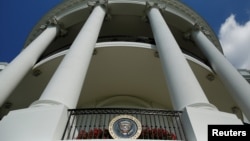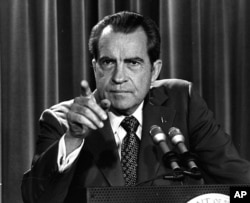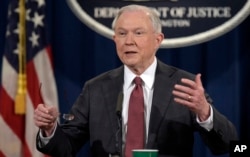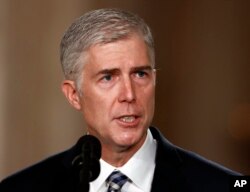Alan B. Morrison is a senior faculty member at The George Washington University School of Law in Washington, where he is associate dean for public-interest and public-service law. During a wide-ranging interview Tuesday with Voice of America, he spoke about the current political debate in the United States swirling around pending investigations of official wrongdoing.
Morrison discussed how and under what principles the U.S. government conducts high-level investigations of official misconduct, citing examples from recent political history and relating how this all is relevant to the current turbulent political climate in Washington. Looking back as far as the Watergate scandal of about 45 years ago, and at incidents as recent as the claim by President Donald Trump that his predecessor, Barack Obama, ordered "wiretapping" of Trump's campaign organization, Morrison has a cautious view.
Basically confident that the American political system is resilient enough to withstand extraordinary pressure, Morrison says in the current circumstances, Americans — from members of Congress to the public — "should start slowly ... and find out what the facts are." He adds: "I don't think we're at a crisis yet. ... We should see what happens and we'll proceed from there."
Here's a transcript of VOA's interview with Alan Morrison:
Question: Historically, how important has it been for the American people to have confidence in the fact that high-level government officials are not above the law, and that they may be subject to investigation if there is evidence of misconduct?
Answer: We were very fortunate for the first 225 years [of U.S. history] not to have that problem. Then Richard Nixon became the president and we had Watergate. And since that time, I think, people have been very concerned about these ethical issues involving the president and the people who work for him. And so it is a big concern now to everybody, and I think people in the administration want to be sure that everybody views them as being above board.
Q: Why is a special counsel or independent Investigator often called in to take charge of such cases?
A: We should separate the sensitive investigation following [the terrorist attacks against the United States on September 11, 2001], where there was no allegation of criminal violations [by national leaders], from those involving Watergate, Iran-Contra and perhaps even today. So in the [September 11 case], the idea was to get to the bottom of what happened and why; nobody was going to be accused of doing anything that could send them to jail. And in that situation, the powers-that-be appointed independent people, former government officials, members of Congress, and they had a staff, they conducted an investigation.
That's not quite what we think is going to happen here, because there are allegations that there may have been criminal violations including perjury — people not telling truth. And so something else is being at least looked at at this time. The problem here is that under our system, the federal government has ... The attorney general is appointed by the president of the United States and could be fired by the president at will, meaning for no reason at all — or for a bad reason, even.
And so the concern is that if the attorney general is investigating the president or his associates, he may hold back and not go after the president or others because of loyalty, or for fear of losing his job. So in a number of situations there have been special prosecutors appointed. This was started when Richard Nixon appointed Archibald Cox, and then fired him, and then appointed Leon Jaworski [whose work] ultimately led to the conviction of a number of people in the Nixon White House. President Nixon resigned, and everybody agreed that that was the situation in which a special prosecutor was needed.
Congress had passed the law to regularize the process of appointing independent counsels, as they were called, but that led to some other problems. Too many counsels were appointed, they stayed too long, they investigated too harshly, and so Congress decided to not extend that law after it expired in the mid-1990s. And the result is that now, if there's going to be an independent counsel appointed, it has to be done by the attorney general. That happened recently with the George W. Bush administration, when there were questions about whether there were some leaks of classified information from the White House. The deputy attorney general appointed a former U.S. attorney from Chicago as the special counsel, the investigations went forward and one of [then-Vice President Dock Cheney's] key advisers, Scooter Libby, was indicted. [Libby] ultimately was convicted and then given a commutation of his sentence.
So we have a long history, at least long from the last 45 years, of requiring independent counsels to satisfy everybody that nothing has happened untowardly. There's an interesting sidelight to this: Edwin Meese was a close adviser to President Ronald Reagan. He was nominated to be the attorney general of the United States, but there was some question raised about some of his activities, and so an independent counsel was appointed and cleared Mr. Meese. Without that kind of independent clearance, the Senate would almost never have confirmed Mr. Meese, so it sometimes works to the advantage of the people being investigated if they really do need a clean bill of health.
Q: But an attorney general is the only one who can appoint a special investigator. What happens when members of Congress call for an independent investigation of the attorney general?
A: Well, the attorney general [Jeff Sessions] has now recused himself — that's a legal word for saying he's not going to participate anymore in any of the investigations. That doesn't quite solve the problem, because he's the subject of an investigation, and if his deputy is being asked to investigate him, at least some people would think maybe that isn't the right way to do things.
Under our current laws, there is no way other than the attorney general or his deputy choosing to appoint a special counsel or an independent counsel — whatever you want to call them. Congress could, in theory, pass a law that would reinstitute our independent counsel law. That seems extremely unlikely now because the president would have to sign it. And if the president is prepared to sign that law, he would be prepared to direct his deputy attorney general to set up an independent counsel [to investigate the attorney general]. So I think right now, we won't have that happening. Nothing, of course, would prevent Congress itself from investigating all of these officials. Congress has plenty of power to investigate, not the least of which [is the power to] impeach not just the president of the United States, but the attorney general, if it so chose. That seems to me to be extremely unlikely, because the House [of Representatives] and the Senate are both controlled by Republicans. And at least as of now, there's not enough evidence to even begin to consider impeachment by those bodies.
Q: Why, for American citizens, is it so important to have confidence that no one is above the law?
A: Well, there are two reasons. One is that the attorney general and the people who work for him enforce the laws of the United States — including the criminal laws, including the laws about perjury. If the attorney general committed perjury — and I don't suggest that he did — or others in the White House committed perjury, although they were probably not under oath ... but they could have made false statements to the FBI, which is also a crime, or if they engaged in illegal activities of some other kind, we are in effect asking the people who enforce the law to be sure that they comply with the law. And the American people deserve the [assurance that] those laws ... have they been satisfied? Are there people violating the law?
And the second reason is that we all have to obey the laws, and no one is above the law in the United States. As Chief Justice John Marshall said many years ago in [the Supreme Court ruling known as] Marbury vs Madison, "We are a country of laws, not of men" — and now we would add, of women. And therefore we're all obligated to pay attention to the laws, and the laws ultimately govern each of us, and that's what the Constitution says.
Q: So in the case of the Trump campaign's alleged ties to Russia, it seems there are many views to pursue that matter. What is your view?
A: Well, I don't know enough facts to know what happens [or] what should happen. I think what's sensible is, we should start slowly and we should start with our normal processes and allow the FBI and the intelligence agencies to get together and find out what the facts are. And at that point when we have a better idea what the facts are, then we can make a judgment. After all, we're not limited to saying, "We have to appoint a special prosecutor now!" We can see what develops. That's, in fact, what happened in Watergate [45 years ago]. There were investigations by the Senate looking into the president's activities, and those ultimately led to the appointment of an independent counsel.
Q: There is a strong perception that it's hard to separate politics from these inquiries. What would you say about the level of public skepticism in these sorts of cases?
A: Well, I think during the Watergate era, there was a similar level [of public skepticism]. In fact, it got to be much higher because it was much more clear at various points when they got along the way, that the president and his closest advisers were directly involved in criminal activity. We haven't gotten to that point yet, [but] I think there's a concern about it. Attorney General Sessions has admitted that he made statements that were less than complete — I'll put it that way — and that's troubling. And I think people are genuinely concerned about what's going to happen. But I don't think we're at a crisis yet. And I think we should see what happens and we'll proceed from there.
Q: In the case of past scandals, such as Watergate, the American public seems to have been satisfied that justice was done. Why were past investigations seen as successful?
A: Because ... the lead investigators were taken out of the political process, the president and attorney general no longer had the authority to fire the person who was in charge of the investigation. And that Independence was essential for public confidence in what happened afterward.
Q: Turning to the Supreme Court, how does President Trump's nomination of federal judge Neil Gorsuch to fill the vacancy on the high court look at the moment?
A: There are two questions there: Whether he can ... get any Democratic votes [for confirmation by the Senate, which would at present require 60 votes — more than there are Republicans in the chamber]. I have no idea the answer to that question. Second is, although the Senate rules currently allow the Democrats to filibuster [to prolong debate indefinitely], the question whether they would choose to do that. And, if so, how long they do it is a matter for the Democrats to decide, and I have no insight into that whatsoever. People could sensibly say, "We're not going to filibuster this nominee because, at least so far, there's nothing other than the fact that he was appointed by Donald Trump as opposed to being appointed by Hillary Clinton [the Democratic presidential candidate who was defeated by Trump in the election] that we find objectionable in him. And that no other Republican nominee is likely to be any less or more objectionable — perhaps more. And so the Democrats may choose not to filibuster. Or they may engage in a limited filibuster of a day or two, and then go on and let him get voted on. So it's impossible to say what's going to happen, but I feel confident that unless something happens, he's likely to be confirmed.
Q: And if Gorsuch is confirmed, the next Supreme Court vacancy could spark a more intense confirmation fight if it involves choosing a successor to one of the court's more liberal justices. What might future confirmation fights look like?
A: Well, we have no idea whether or when there will be a vacancy, or who will be the next justice retiring, so it's very hard to say. If it happens while the Republicans continue to be in control of the Senate, Democrats won't have a lot of leverage; if it happens at a time when Republicans have lost control of the Senate, we have a quite different battle. It's just too hard to figure out what's happening now.
Q: If Gorsuch is confirmed, what do you see as his impact on the court?
A: Impossible to say. He will not be another Justice [Antonin] Scalia [whose sudden death in January 2016 created the current vacancy]. But no one will be another Justice Scalia, on either side of the aisle [from either major party].
Q: Back to President Trump's allegation that former President Barack Obama had the Trump campaign "wiretapped"; what legal issues may arise from this?
A: You're talking about the wiretap? Well, the first question is not a legal question; it's a factual question. Is there any basis for it? And so far there has been no evidentiary basis other than suspicion. And suspicion is not enough to start an investigation. The other problem, of course, is that when an accusation is made that you did something, it's very hard, as the lawyers say, to prove a negative. How do you show that something didn't happen? And so here, all the intelligence community and the FBI can do is to put somebody up and say it didn't happen. And somebody will come back and say to them, well how do we know unless we see all of your files — which is not going to happen. So it's going to be hard to prove a negative [for those who disagree with President Trump's assertion to refute his claim conclusively]. But I think the thrust of the response is going to be, well, do you have some specific facts in mind that even suggests the possibility of [wiretapping]? And I think so far the answer is no.
Now as far as the Trump travel ban is concerned, I'm very reluctant to comment on his executive orders. Because what the [White House] press release says and what the executive order says, and then what it actually turns out to do are often very different things. And so I wouldn't want to comment on that. But if [this week's revised executive order on immigration] is anything like the first one [which was rejected by U.S. courts], he'll certainly get sued about it, and we'll just have to see what happens.
Would one say this president enjoys lawsuits? I don't know that he enjoys them. He engages in them. He gets sued an awful lot; there were hundreds of lawsuits against him as a commercial real-estate developer [Trump's profession prior to politics]. I have no way of knowing whether that's an unusual amount, but it certainly seems to be more [litigation] than most commercial real-estate developers have.
Q: He also countersues when someone begins legal action against him ...
A: Well, he's now got his wife suing [a British newspaper, on the grounds that defamatory comments about her negatively affected her ability to launch a successful business career]. It is hard to believe that case is going to go forward. Is she really going to want to get up and testify how she was planning on taking advantage of the Trump presidency to promote her products for her personal gain? I would be very surprised to see her actually appear under oath, which you would have to do to say that. But we'll see.
Q: Could Obama take legal action against Trump as a result of the president's tweets and accusations last week?
A: I suppose in theory President Obama could sue — former President Obama could sue current President Trump for defamation. That would probably — almost certainly — not be done by President Obama; it's just not the way he operates. ... I think that kind of allegation is best responded to, not in the courts, but in the court of public opinion.








